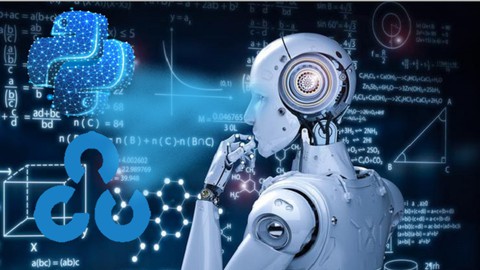
Learn Python & OpenCV for Computer Vision Deep Learning, OCR
Learn Python & OpenCV for Computer Vision Deep Learning, OCR, available at $59.99, has an average rating of 4.9, with 72 lectures, 2 quizzes, based on 24 reviews, and has 117 subscribers.
You will learn about Learn Python from the ground up and build your own computer vision and deep learning solutions. Understand Python data types, operators, loops, functions, modules, and file handling, as well as best coding practices. Master advanced Python concepts such as lambda functions, object-oriented programming, decorators, and generators. Learn to use Python built-in libraries such as DateTime, Math, Random, Statistics, Sys, and OS. Gain expertise in Numpy, Pandas, Matplotlib, and OpenPyXL for high-performance data manipulation and visualization. Build a strong foundation in OpenCV to work with images and videos efficiently. Use OpenCV to perform image thresholding, noise removal, cropping, rotation, annotation, and detection. Apply OpenCV to live webcam and recorded video streams. Develop Python solutions for web scraping, sending emails using Flask, and extracting text from PDF documents. Build OpenCV solutions for template matching and object tracking in real time. This course is ideal for individuals who are Beginners to Python and OpenCV who are interested in learning computer vision and deep learning. or Software developers who want to add computer vision and deep learning capabilities to their applications. or Data scientists who want to use computer vision and deep learning to analyze and interpret data. or Researchers who want to use computer vision and deep learning to develop new technologies and solutions. or Anyone who is interested in learning about computer vision and deep learning, regardless of their background or experience. It is particularly useful for Beginners to Python and OpenCV who are interested in learning computer vision and deep learning. or Software developers who want to add computer vision and deep learning capabilities to their applications. or Data scientists who want to use computer vision and deep learning to analyze and interpret data. or Researchers who want to use computer vision and deep learning to develop new technologies and solutions. or Anyone who is interested in learning about computer vision and deep learning, regardless of their background or experience.
Enroll now: Learn Python & OpenCV for Computer Vision Deep Learning, OCR
Summary
Title: Learn Python & OpenCV for Computer Vision Deep Learning, OCR
Price: $59.99
Average Rating: 4.9
Number of Lectures: 72
Number of Quizzes: 2
Number of Published Lectures: 72
Number of Published Quizzes: 2
Number of Curriculum Items: 74
Number of Published Curriculum Objects: 74
Original Price: $109.99
Quality Status: approved
Status: Live
What You Will Learn
- Learn Python from the ground up and build your own computer vision and deep learning solutions.
- Understand Python data types, operators, loops, functions, modules, and file handling, as well as best coding practices.
- Master advanced Python concepts such as lambda functions, object-oriented programming, decorators, and generators.
- Learn to use Python built-in libraries such as DateTime, Math, Random, Statistics, Sys, and OS.
- Gain expertise in Numpy, Pandas, Matplotlib, and OpenPyXL for high-performance data manipulation and visualization.
- Build a strong foundation in OpenCV to work with images and videos efficiently.
- Use OpenCV to perform image thresholding, noise removal, cropping, rotation, annotation, and detection.
- Apply OpenCV to live webcam and recorded video streams.
- Develop Python solutions for web scraping, sending emails using Flask, and extracting text from PDF documents.
- Build OpenCV solutions for template matching and object tracking in real time.
Who Should Attend
- Beginners to Python and OpenCV who are interested in learning computer vision and deep learning.
- Software developers who want to add computer vision and deep learning capabilities to their applications.
- Data scientists who want to use computer vision and deep learning to analyze and interpret data.
- Researchers who want to use computer vision and deep learning to develop new technologies and solutions.
- Anyone who is interested in learning about computer vision and deep learning, regardless of their background or experience.
Target Audiences
- Beginners to Python and OpenCV who are interested in learning computer vision and deep learning.
- Software developers who want to add computer vision and deep learning capabilities to their applications.
- Data scientists who want to use computer vision and deep learning to analyze and interpret data.
- Researchers who want to use computer vision and deep learning to develop new technologies and solutions.
- Anyone who is interested in learning about computer vision and deep learning, regardless of their background or experience.
Become a Computer Vision and Deep Learning Expert with Python and OpenCV
In this comprehensive course, you’ll learn everything you need to know to master computer vision and deep learning with Python and OpenCV. You’ll start with the basics of Python and OpenCV, and then gradually work your way up to more advanced topics, such as:
-
Image processing
-
Object detection and tracking
-
Scene classification
-
Image segmentation
-
Deep learning models for computer vision
You’ll also learn how to build your own computer vision and deep learning applications using Python and OpenCV. By the end of the course, you’ll be able to develop cutting-edge computer vision solutions to real-world problems.
What sets this course apart?
-
Comprehensive coverage of both Python and OpenCV
-
35+ supporting notebooks available for download
-
5 different varieties of projects to develop
-
Tutorials on setting up PyCharm and using Google Colab
-
Regular assessments to help you track your progress
Why learn Computer Vision and Deep Learning?
Computer vision and Deep Learning are two of the most rapidly growing fields in technology today. They are used in a wide variety of applications, including:
-
Self-driving cars
-
Medical imaging
-
Robotics
-
Security and surveillance
-
Social media and entertainment
If you’re interested in a career in computer vision or deep learning, or if you simply want to learn about these exciting technologies, then this course is for you!
Course Curriculum
Chapter 1: Course Starter
Lecture 1: Learning Path
Lecture 2: Course Starter – How to approach the course
Lecture 3: Udemy Review
Chapter 2: Introduction to Python
Lecture 1: Objectives
Lecture 2: What is Python?
Lecture 3: Journey of Python
Lecture 4: Why Learn Python?
Chapter 3: Python Setup
Lecture 1: Objectives
Lecture 2: Python Setup on Windows
Lecture 3: Python Setup on Ubuntu
Lecture 4: Using Google Colab
Chapter 4: Data Types and Operators
Lecture 1: Objectives
Lecture 2: Variables and Data Types
Lecture 3: Data Type – Numeric and Boolean with Variables
Lecture 4: Data Type – String
Lecture 5: Data Type – Lists
Lecture 6: Data Type -Tuples
Lecture 7: Data Type – Sets
Lecture 8: Data Type – Dictionaries
Lecture 9: Operators
Chapter 5: Loops – If-Else, For, While
Lecture 1: Objectives
Lecture 2: If Elif and Else Statements
Lecture 3: For and While Loop
Chapter 6: Functions, Modules & File Handling
Lecture 1: Objectives
Lecture 2: Functions with *args and **kwargs Arguments
Lecture 3: Modules and Packages
Lecture 4: I/O with Basic Files
Chapter 7: Popular Coding Practices and Exception Handling
Lecture 1: Objectives
Lecture 2: Popular Coding Practices
Lecture 3: Exception Handling
Chapter 8: Advanced Functions – Lambda, Map, Filter, Reuse
Lecture 1: Objectives
Lecture 2: Lambda Expressions, Map, and Filter Functions
Chapter 9: Object Oriented Programming, Decorator and Generator
Lecture 1: Objectives
Lecture 2: Object Oriented Programming Concept
Lecture 3: Object Oriented Programming Implementation
Lecture 4: Decorator
Lecture 5: Generator
Chapter 10: Built-in Modules – DateTime, Math, Random, Statistics, Sys, OS
Lecture 1: Objectives
Lecture 2: DateTime
Lecture 3: Math, Random and Statistics
Lecture 4: Sys and OS
Chapter 11: External Libraries – Numpy, Pandas, Matplotlib, OpenPyXL
Lecture 1: Objectives
Lecture 2: Numpy
Lecture 3: Pandas
Lecture 4: Matplotlib
Lecture 5: OpenPyXL
Chapter 12: Introduction to OpenCV
Lecture 1: Objectives
Lecture 2: What is OpenCV?
Lecture 3: Tool Setup – OpenCV – Ubuntu
Lecture 4: Tool Setup – OpenCV – Windows
Lecture 5: Image Basics
Lecture 6: Image Reading , Writing and Resizing
Chapter 13: Image Thresholding
Lecture 1: Objectives
Lecture 2: Simple Thresholding, Adaptive Thresholding and Otsu's Binarization
Chapter 14: Image Noise Removal
Lecture 1: Objectives
Lecture 2: Noise Removal – Small Dots, Image Blurring, Dilation, Erosion and Kernels
Chapter 15: Image Cropping & Rotation Techniques
Lecture 1: Objectives
Lecture 2: Image Cropping & Rotation
Chapter 16: Image Annotation
Lecture 1: Objectives
Lecture 2: Draw Text, Rectangle, Circle and Line on Image
Chapter 17: Image Detection Techniques
Lecture 1: Objectives
Lecture 2: Image Detection – Blob, Edge and Contour
Chapter 18: OpenCV for Videos
Lecture 1: Objectives
Lecture 2: Reading from Recorded Video & Reading and Writing from LIVE camera
Chapter 19: OpenCV for OCR
Lecture 1: Overview of OCR using EasyOCR
Lecture 2: How to Implement EasyOCR for OCR Operations
Chapter 20: Project 1 – Python Web Scraping using BeautifulSoup and RegEx
Lecture 1: Project Demo – Python Web Scraping using BeautifulSoup and RegEx
Chapter 21: Project 2 – Sending Email with Python (Flask)
Lecture 1: Project Demo – Sending Email with Python (Flask)
Chapter 22: Project 3 – Extract text from PDF using Python
Lecture 1: Project Demo – Extract text from PDF using Python
Chapter 23: Project 4 – Template matching using OpenCV
Lecture 1: Project Demo – Template matching using OpenCV
Chapter 24: Project 5 – Track Object by Marking in Live Camera using OpenCV
Lecture 1: Project Demo – Track Object by Marking in Live Camera using OpenCV
Chapter 25: More Learnings
Lecture 1: More Learnings
Instructors
-
Vineeta Vashistha
Technical Architect – Deep Learning
Rating Distribution
- 1 stars: 1 votes
- 2 stars: 0 votes
- 3 stars: 1 votes
- 4 stars: 3 votes
- 5 stars: 19 votes
Frequently Asked Questions
How long do I have access to the course materials?
You can view and review the lecture materials indefinitely, like an on-demand channel.
Can I take my courses with me wherever I go?
Definitely! If you have an internet connection, courses on Udemy are available on any device at any time. If you don’t have an internet connection, some instructors also let their students download course lectures. That’s up to the instructor though, so make sure you get on their good side!
You may also like
- Top 10 Financial Technology Courses to Learn in December 2024
- Top 10 Agile Methodologies Courses to Learn in December 2024
- Top 10 Project Management Courses to Learn in December 2024
- Top 10 Leadership Skills Courses to Learn in December 2024
- Top 10 Public Speaking Courses to Learn in December 2024
- Top 10 Affiliate Marketing Courses to Learn in December 2024
- Top 10 Email Marketing Courses to Learn in December 2024
- Top 10 Social Media Management Courses to Learn in December 2024
- Top 10 SEO Optimization Courses to Learn in December 2024
- Top 10 Content Creation Courses to Learn in December 2024
- Top 10 Game Development Courses to Learn in December 2024
- Top 10 Software Testing Courses to Learn in December 2024
- Top 10 Big Data Courses to Learn in December 2024
- Top 10 Internet Of Things Courses to Learn in December 2024
- Top 10 Quantum Computing Courses to Learn in December 2024
- Top 10 Cloud Computing Courses to Learn in December 2024
- Top 10 3d Modeling Courses to Learn in December 2024
- Top 10 Mobile App Development Courses to Learn in December 2024
- Top 10 Graphic Design Courses to Learn in December 2024
- Top 10 Videography Courses to Learn in December 2024






















